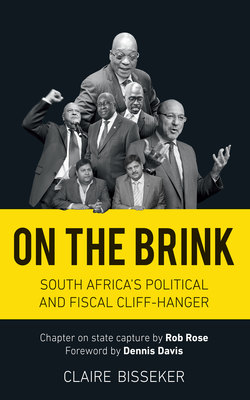Читать книгу On the Brink - Claire Bisseker - Страница 5
На сайте Литреса книга снята с продажи.
Foreword
ОглавлениеClaire Bisseker’s On the Brink: South Africa’s Political and Fiscal Cliff-hanger is a very timeous contribution to our national debate.
As Professor Adam Habib says in a passage cited in this book, our economic discourse has taken the shape of a binary adherence to a belief in the free market (and a rigid adherence to the mechanisms thereof) versus a retreat to 1960s Soviet economics, in which nationalisation of industry is seen as a panacea for the economic problems of a developing country. The fact that these are the two dominant models in which South African economic debate now takes place reveals the very poverty of thinking about so vital a national problem.
This book, in clear and concise terms, reflects upon how we have come to this pass and why these two strains of economics are now hegemonic within our public life. As Bisseker shows, this situation is particularly depressing, in that the democratic government after 1994 rose to the extraordinary challenges that had been posed as a result of the mismanagement of the economy by the apartheid government, as well as the levels of corruption and unaccountability that characterised political life prior to 1994.
For example, under the leadership of Trevor Manuel, the debt-to-GDP ratio was halved from over 50% and the country’s finances stabilised. Absent this achievement, interest on debt would have overwhelmed any capacity of the state for reconstruction. Manifestly, this achievement alone was insufficient to solve 300 years of gross exploitation and the racially skewed economy produced thereby.
Hence, the problem that now confronts the country has been its inability to develop a meaningful programme of reconstruction of the economy, which would make 50 million South Africans economic citizens (as opposed to simply political citizens) – and this all within the context of globalisation.
In summary, neither a myopic free-enterprise approach nor a return to the kind of Soviet economics that had such disastrous consequences more recently in Venezuela can solve the fundamental problem: meaningfully growing an economy that benefits all who live in it.
There can be no doubt that perpetuating the profound inequalities of South Africa and the degrading daily reality that confronts historically disadvantaged communities of millions of people (who, sadly, remain presently disadvantaged) is not only immoral, but also unsustainable in the long run if our democratic enterprise is to attain permanent traction.
This book provides an opportunity for deep reflection on these realities and the consequent need to think laterally towards the creation of economic policies that will benefit all in a meaningful fashion rather than just a few.
The task is not to ensure that the demography of the ownership of the economy changes from a few whites to a few black capitalists alone but rather that the levels of inequality and poverty that characterise today’s South Africa are radically transformed, so that we can then truly say South Africa belongs to every single person who lives in this country.
For this reason, this book comes at a most propitious time in our history as we are enjoined to move beyond populist slogans and instead debate how to grow the economy significantly, that is to the 4% to 5% GDP growth rates as promised in the National Development Plan – an achievement that would simultaneously provide a truly meaningful economic stake for all 50 million South Africans.
Judge Dennis Davis
